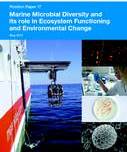- Home
- About
- OSD
- MyOSD
- Partners
- Work Packages
- WP 1Management & Coordination
- WP 2 (OSD)Ocean Sampling Day
- WP 3Oceanography & Environmental Data
- WP 4Standards and Interoperability
- WP 5Bioinformatics & Data Integration
- WP 6Exploring Ecosystems Biology
- WP 7Function and Biotechnology
- WP 8Intellectual Property (IP) Management for Marine Bioprospecting
- WP 9Dissemination & Outreach
- Public DeliverablesAll Micro B3's public deliverables
- Meetings
- Workshops
- Third Micro B3 Industry Expert Workshop
- Micro B3 Industry Expert Workshop
- Micro B3/OSD Analysis Workshop
- Micro B3 Stakeholder Workshop
- Micro B3 Summer School in Crete 2014
- Marine Metagenomics Bioinformatics
- Micro B3 Industry expert workshop
- EU-US Training 2013
- Micro B3 Statistics Training 2013
- MG4U Bioinformatics Training 2013
- Bioinformatics Training 2012
- EU-US Training 2012
Marine microorganisms hold the key to life on earth
 New Marine Board position paper reveals the importance of marine microbial diversity for our environment and society and proposes concrete actions to guide future European research
New Marine Board position paper reveals the importance of marine microbial diversity for our environment and society and proposes concrete actions to guide future European research
Few people realize that all life on earth evolved from microorganisms in the sea. Microorganisms, or microbes, are those organisms too small to be observed by the human eye and they are everywhere, often in huge numbers. Just one litre of coastal seawater contains up to a billion microbes including thousands of different types.
Scientists have long recognized the importance of microbes, which form the basis of all food webs and drive the complex biogeochemical cycles which recycle key elements such as carbon and nitrogen. Given that the oceans account for more than 90% of the Earth’s biosphere - that portion of the earth able to support life - it is hardly surprising that marine microorganisms account for a large part of the total biomass of life on Earth. They also produce more than half of the entire global oxygen supply and, in doing so, use up a large proportion of human-generated CO2, a greenhouse gas that is accelerating global warming.
The new Marine Board position paper, Marine Microbial Diversity and its role in Ecosystem Functioning and Environmental Change, takes a look at some of the key scientific and societal questions that will drive the European research agenda in the coming years.
Frank Oliver Glöckner of the Max Planck Institute for Marine Microbiology & Jacobs University Bremen in Germany, and Chair of the Marine Board expert working group which produced the paper, explains why a roadmap for future research in this area was urgently needed: “we have known for some time that marine microorganisms are a crucial component of the Earth’s life-support system. Yet despite their obvious importance, very little is known about them, including how many different types are present in the oceans, what the role of each of them is and even how to define a microbial species.”
The Marine Board paper describes how Europe has traditionally played a leading role in marine microbial research and examines how the field is advancing rapidly, driven by technological and scientific developments and the problems of global change, population growth and over-exploitation of marine resources. To maintain Europe’s competitiveness in this important area of research, the paper calls for the establishment of a coordinated, pan-European research programme focused on marine microbiology, but cautions that funds for research alone will not be sufficient.
To support future research, the paper also calls for the establishment of a European repository for cultivated microbial collections and a centre for marine data management. “The implementation of omics technologies will generate unprecedented amounts of data,” says Kostas Nittis, Chair of the Marine Board, “this paper sends the important message that a coordinated European data centre will be essential to ensure that we are able to optimize the use of this data for the benefit of society.”
The Position Paper has been presented at the European Maritime Day in Gothenburg on 21 May 2012 (see http://ec.europa.eu/maritimeaffairs/maritimeday/index_en.htm for full programme).
The report is available online: www.marineboard.eu/publications
For more information on the scientific recommendations, please contact working group Chair Frank Oliver Glöckner (Max Planck Institute for Marine Microbiology Bremen & Jacobs University Bremen, Germany). European Marine Board contact: Jan‐Bart Calewaert.
The European Marine Board provides a pan‐European platform for its member organizations to develop common priorities, to advance marine research and to bridge the gap between science and policy, in order to meet future marine science challenges and opportunities. www.marineboard.eu
 The European Marine Board works in association with the European Science Foundation (ESF), an independent, non‐governmental organization that promotes collaboration in scientific research, funding of research and science policy across Europe. www.esf.org
The European Marine Board works in association with the European Science Foundation (ESF), an independent, non‐governmental organization that promotes collaboration in scientific research, funding of research and science policy across Europe. www.esf.org



